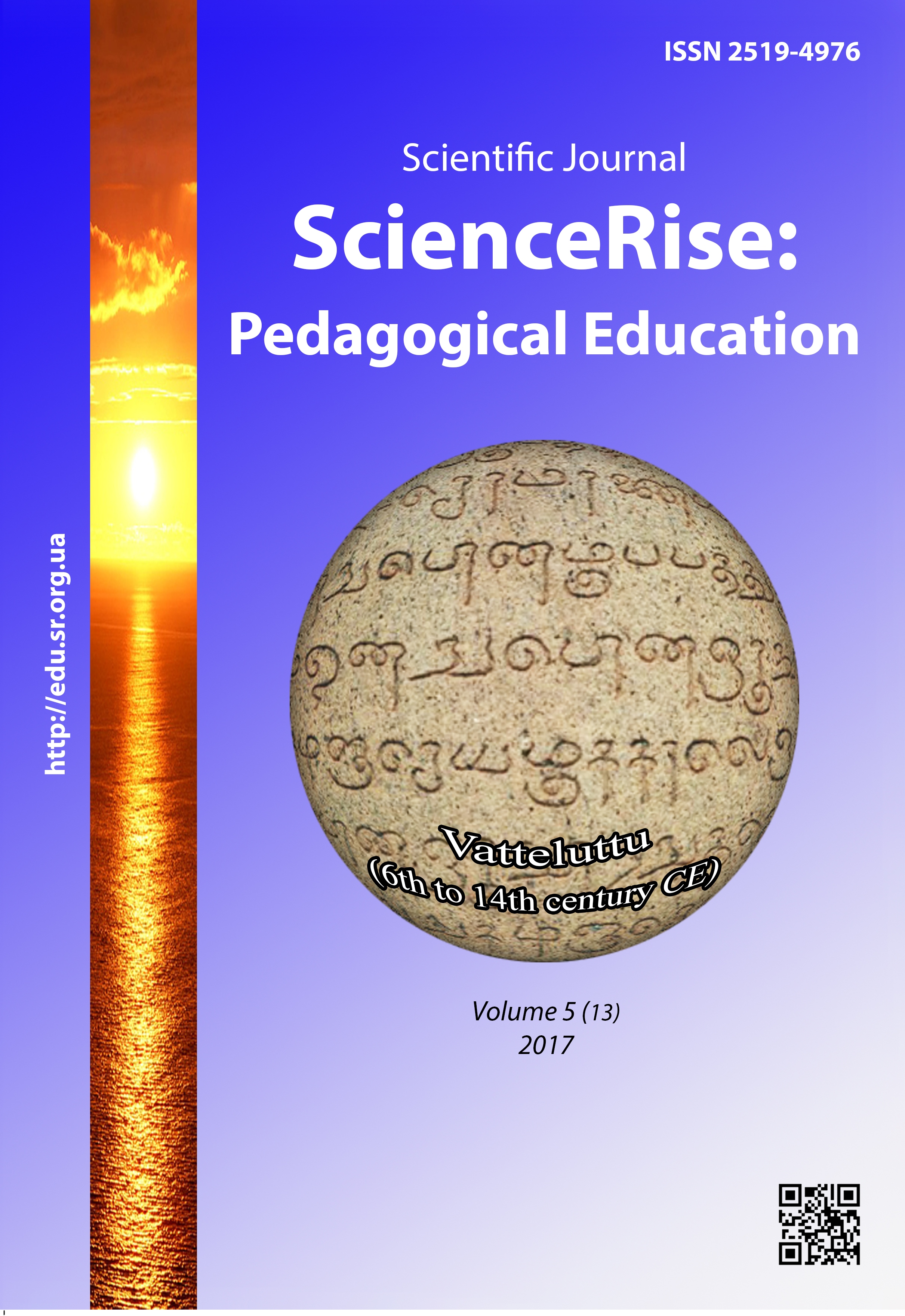Choral-conductor training of future teachers in the Poltava institute of national education (1921–1941)
DOI:
https://doi.org/10.15587/2519-4984.2017.102803Keywords:
choral-conductor training, future teacher, singing, conduction, chore, formation, competenceAbstract
In the article is considered the state of choral-conductor training of a future teacher in educational institutions of the end of ХІХ – beginning of ХХ century (teacher institutes and seminaries), especially in the Poltava institute of national education (1921–1941). Its components were determined and characterized (theoretical training, methodology of vocal-choral work, choral conducting, choral singing). There were elucidated the content (formation of conducting, vocal-choral knowledge, abilities and skills, use of diverse choral repertoire), forms (lectures and practical activities, concert performances, conducting-choral practice, discussions, debates) and methods (creation analysis, instrumental execution of score, signing of parts, conducting of creation, work with chore) of conductor-choral training by teachers of the department of art studies under the guidance of the famous Ukrainian teacher, musical expert, ethnographer, choreographer, conductor and composer V.M. Verkhovinets. There was grounded its effectiveness in the process of future teacher’s professional competences formation. There were elucidated the content and character of creative activity of the student chore of the Poltava INE (executive, theoretical, methodological and cultural-educational aspects) in the aforesaid historical period
References
- Otich, O. M.; Zyazyun, I. A. (Ed.) (2008). Mistetstvo u rozvitku individualnosti pedagoga: istorichniy i metodologichniy aspekti. Chernivtsi: Zelena Bukovina, 439.
- Tanko, T. P. (1998). Muzichno-pedagogichna osvita v Ukrayini. Kharkiv: Osnova, 192.
- Sulaeva, N. V. (2013). Pidgotovka vchitelya v pedagogichnomu prostori neformalnoyi mistetskoyi osviti. Poltava: PNPU imeni V. G. Korolenka, 408.
- Blagova, T. O. (2009). Rozvitok shkilnoyi i profesiynoyi mistetskoyi osviti na Poltavschini (druga polovina XIX – pochatok XX st.). Poltava: Oriyana, 240.
- God, B., Ermak, O., Kiridon, P. (2009). Poltavskiy derzhavniy pedagogichniy universitet imeni V. G. Korolenka: Istoriya i suchasnist. Poltava: PDPU imeni V. G. Korolenka, 194.
- Lobach, O. O., Dem’yanko, N. Yu., Vovchenko, S. V., Gaydamaka, V. M. et. al. (2014). Stanovlennya muzychnykh tradytsiy u Poltavsʹkomu pedahohichnomu instytuti imeni V. H. Korolenka (1934–1980). Kafedra muziki Poltavskogo natsionalnogo pedagogichnogo universitetu imeni V. G. Korolenka: retrospektivniy analiz. Poltava: TOV ASMI, 373.
- Kozyr, A. (2011). Dyryhent•sʹko-khorova pidhotovka yak osnova fakhovoho stanovlennya maybutnʹoho vchytelya muzyky. Molod i rynok, 11 (82), 19–24.
- Smirnova, T. (2004). Dyryhentsko-khorova pidhotovka u vyshchykh pedahohichnykh zakladakh osvity Ukrayiny. Kharkiv, 173–181.
- Central'nyj derzhavnyj arhiv vyshhyh organiv vlady ta upravlinnja Ukrai'ny (CDAVOV Ukrai'ny). Od. zb. 1101. 166 (1), 145–167.
- Central'nyj derzhavnyj arhiv vyshhyh organiv vlady ta upravlinnja Ukrai'ny (CDAVOV Ukrai'ny). Od. zb. 1123 (Materialy pro stan ta navchal'no-vyhovnu robotu Poltavs'kogo INO za 1921–1924 n. r.). 166 (2), 214.
- Arhiv Poltavs'kogo nacional'nogo pedagogichnogo universytetu imeni V. G. Korolenka. Zapysky Poltavs'kogo INO 1925/26 ak. roku, 390.
- Arhiv Poltavskogo natsionalnogo pedagogichnogo universitetu imeni V. G. Korolenka. Spohady M. A. Fisuna, 3.
- Arhiv Ya. V. Verhovintsya. Spohady O. V. Svyeshnykova, 5.
- Verhovinets, V. M. (1989). Vesnyanochka. Kyiv: Muz. Ukrayina, 342.
Downloads
Published
How to Cite
Issue
Section
License
Copyright (c) 2017 Nataliya Dem’yanko

This work is licensed under a Creative Commons Attribution 4.0 International License.
Our journal abides by the Creative Commons CC BY copyright rights and permissions for open access journals.
Authors, who are published in this journal, agree to the following conditions:
1. The authors reserve the right to authorship of the work and pass the first publication right of this work to the journal under the terms of a Creative Commons CC BY, which allows others to freely distribute the published research with the obligatory reference to the authors of the original work and the first publication of the work in this journal.
2. The authors have the right to conclude separate supplement agreements that relate to non-exclusive work distribution in the form in which it has been published by the journal (for example, to upload the work to the online storage of the journal or publish it as part of a monograph), provided that the reference to the first publication of the work in this journal is included.








